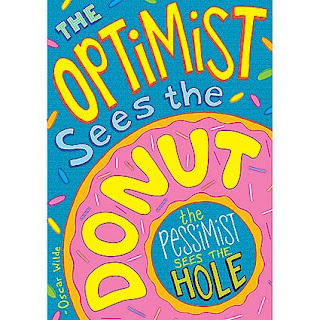Learning to be Cheerful
Can you learn to be cheerful? Is it even a realistic goal? Can you choose a path of optimism? What is optimism?
Daniel Goleman states in his book, Emotional Intelligence (1995) that optimism " means having a strong expectation that, in general, things will turn out all right in life, despite setbacks and frustrations...optimism is an attitude that buffers people against falling into apathy, hopelessness or depression in the face of tough going."
Life is tough. Whether you are a student, a teenager, a young parent, an old parent, employed, unemployed, in love or nursing a broken heart. Life is a road which carries many bumps, it is how we choose to navigate the road which can make the journey enjoyable, miserable, magnificent, or dull.
There will always be something with you as you make your journey.
It will go everywhere with you.
It will be always on display.
It has no size.
It has no colour.
People will make judgements about you based on it.
Its impact on your life is profound.
What can it be?
It is your attitude.
An optimistic attitude prepares you to anticipate success and to bounce back from setbacks. A positive attitude will enable you to see obstacles as opportunities and to remain motivated to achieve your goals. An optimistic outlook will help you make self-fulfilling prophecies work for you rather than against you. If you expect things to turn out well, they are more likely to do so.
Optimism is such a wonderful tool because it gives you the confidence to cope with positive and negative events. It helps you to approach situations with assurance, persistence, and an expectation of success. Being optimistic means, you have a natural aptitude for happiness. That you can manage your perspective and that you can take an active role in creating the life you want.
A valuable lesson to learn here though is that for some people, an optimistic outlook will simply not work. Some people, unbelievably, are quite happy being miserable. I had a long relationship with such a person, He would use my 'optimistic outlook' as a weapon against me. Obviously, the relationship ended. He is still quite happy being miserable. But that's life. His glass will be forever half empty. At the end of a tunnel, I will see daylight, he will see the headlights of an oncoming train.
I will see the doughnut; he will see the hole.
You can keep your glass half full by accentuating the positive aspects of a situation. This doesn't mean you are ignoring or denying the negative aspects, it's simply a decision to seek encouragement rather than discouragement.
Another key aspect in keeping your glass half full is to express gratitude for what you have or what you have experienced. People who show their appreciation feel more alert, optimistic, enthusiastic, and positive.
Of course, it is true that when the going gets tough it will be more difficult to be grateful than when things are going well. However, it is a valuable lesson to learn that it is during challenging times that we need gratitude the most.
Remember:
"The happiness of your life depends on the quality of your thoughts.'
Marcus Aurelius
(AD 121-180)
You can keep your glass half full by accentuating the positive aspects of a situation. This doesn't mean you are ignoring or denying the negative aspects, it's simply a decision to seek encouragement rather than discouragement.
Another key aspect in keeping your glass half full is to express gratitude for what you have or what you have experienced. People who show their appreciation feel more alert, optimistic, enthusiastic, and positive.
Of course, it is true that when the going gets tough it will be more difficult to be grateful than when things are going well. However, it is a valuable lesson to learn that it is during challenging times that we need gratitude the most.
Remember:
"The happiness of your life depends on the quality of your thoughts.'
Marcus Aurelius
(AD 121-180)


